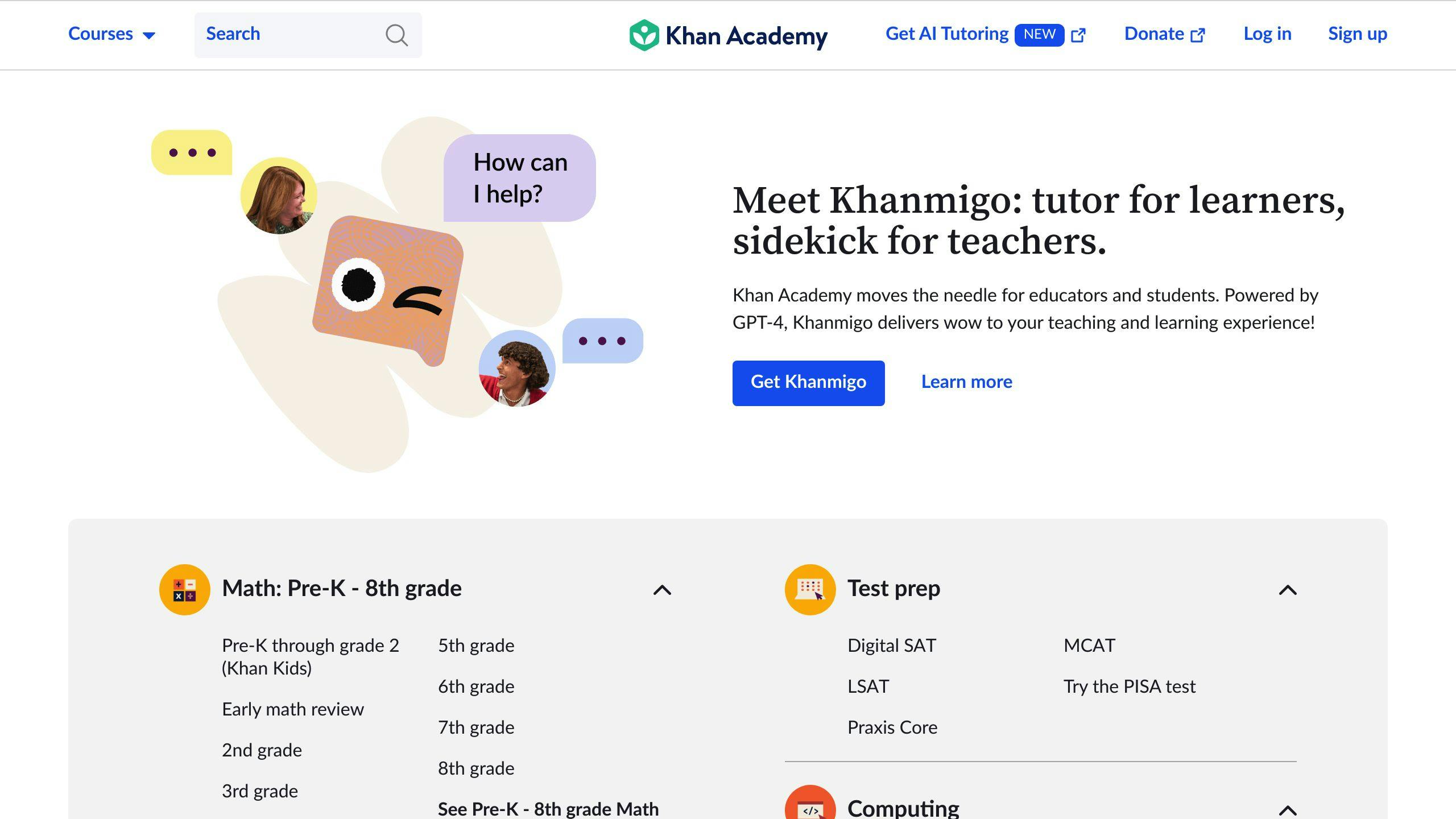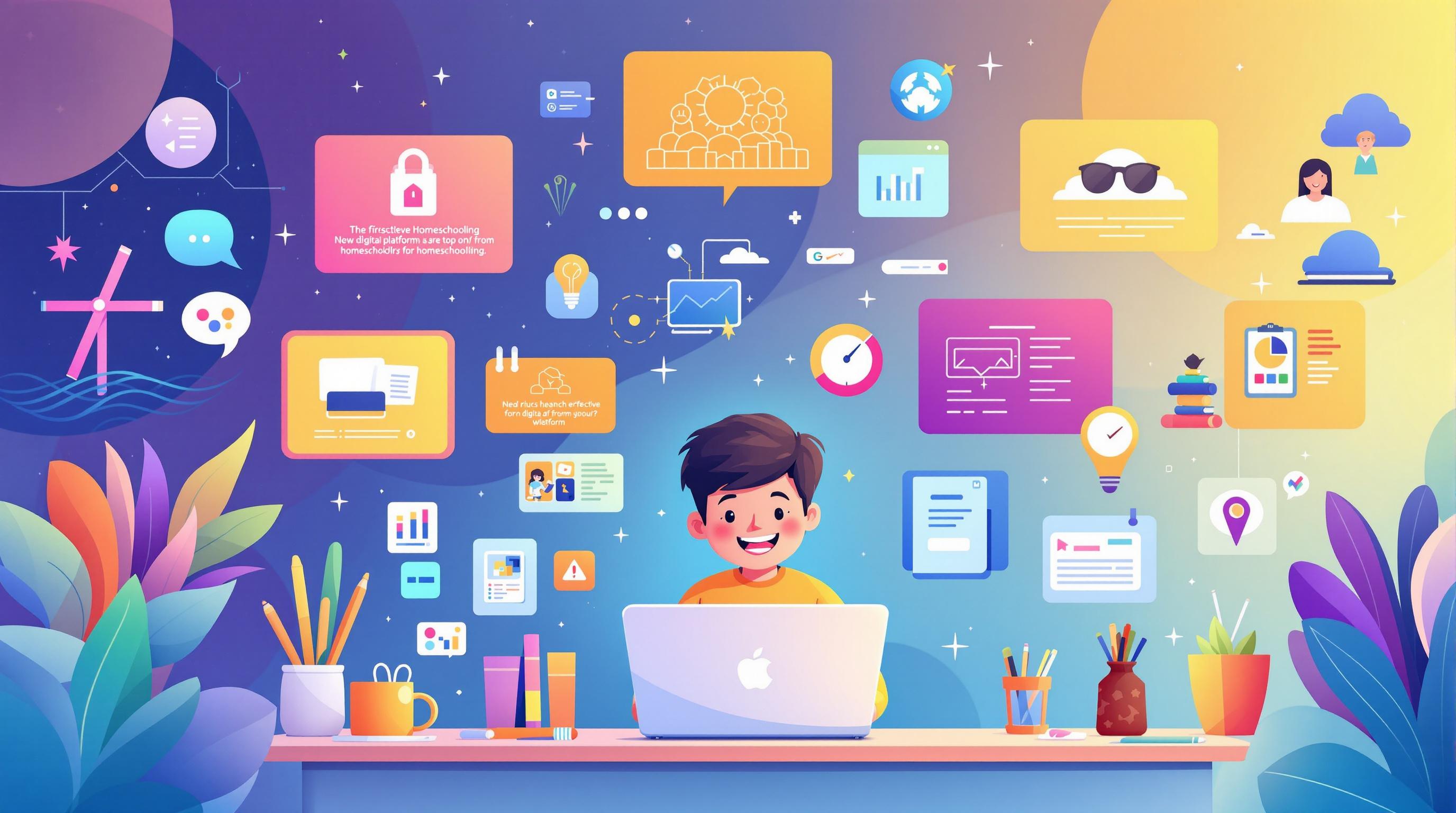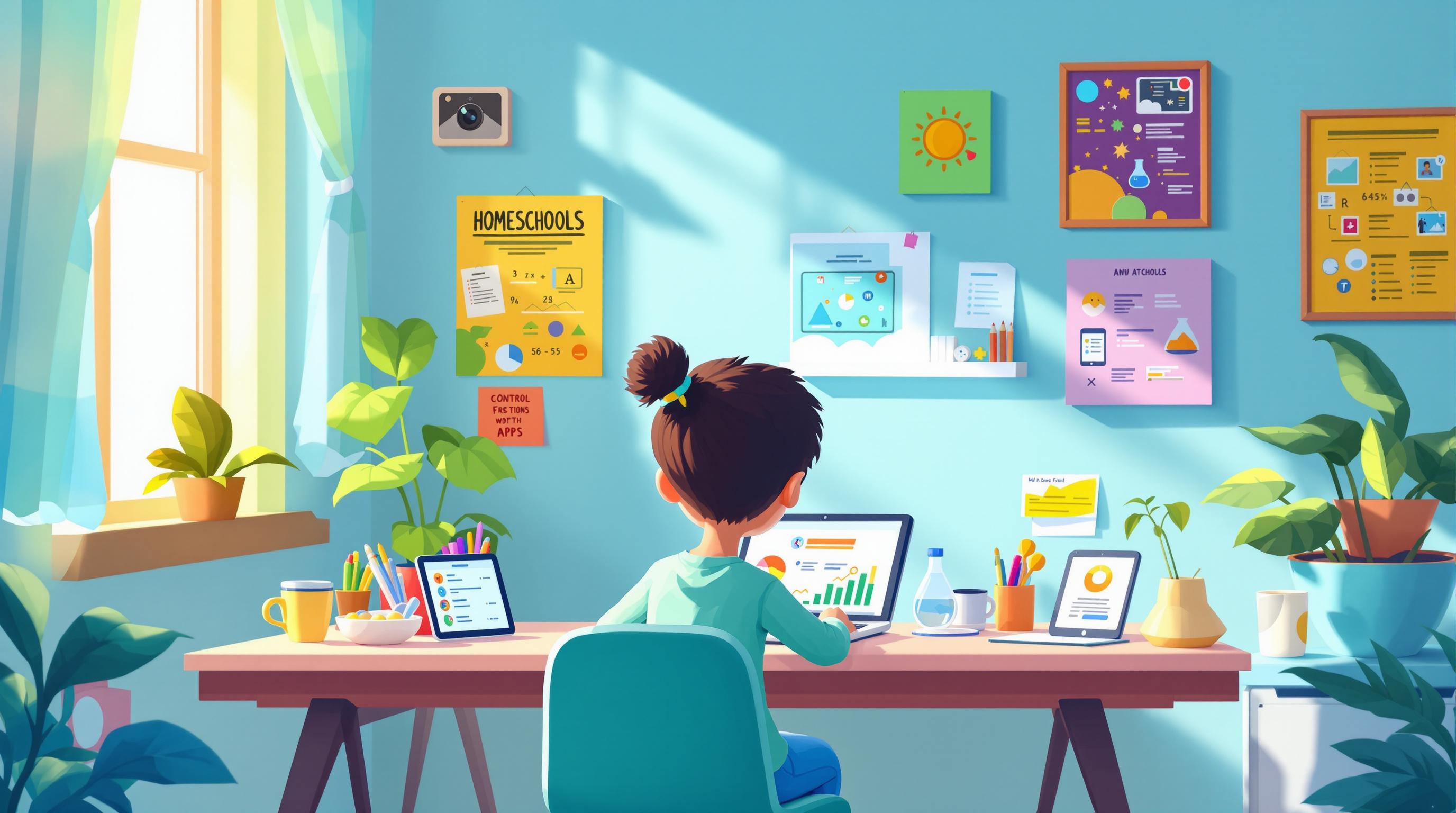Homeschooling kids with ADHD can be tough, but the right tools make a big difference. ADHD impacts focus, time management, and task organization - key areas where apps can help. Here's a quick guide to the best apps for managing ADHD challenges in homeschooling:
- Time Management: Use apps like NotePlan to schedule and track tasks.
- Focus and Engagement: Tools like Habitica gamify learning, turning tasks into fun quests.
- Emotional Regulation: Headspace offers mindfulness exercises and focus music.
- Learning Support: Khan Academy provides short, interactive lessons with progress tracking.
Quick Comparison of ADHD Apps for Homeschooling
| App Name | Key Features | Cost | Best For |
|---|---|---|---|
| NotePlan | Task scheduling, note-taking | Paid | Time management, organization |
| Inflow | ADHD-specific focus and habit tools | Paid | ADHD strategies, habit tracking |
| Habitica | Gamified productivity | Free | Motivation, engagement |
| Khan Academy | Free educational resources | Free | Learning support, progress tracking |
| Headspace | Mindfulness, focus music, movement | Paid | Emotional regulation, focus |
These apps, combined with homeschooling flexibility, can help ADHD kids thrive. Start with free options like Habitica or Khan Academy to see what works best for your child.
How ADHD Impacts Homeschooling
What is ADHD and Its Effect on Learning?
ADHD can significantly influence how children engage with their learning environment. Kids with ADHD often face challenges like:
- Focus and Task Management: Struggling to stay on task, especially with activities requiring sustained effort or multiple steps.
- Time Awareness: Difficulty organizing schedules and estimating how long tasks will take.
- Information Processing: Trouble filtering distractions and prioritizing what’s important.
These hurdles make it clear that a more personalized educational approach can be incredibly helpful - and that’s where homeschooling comes in.
Why Homeschooling Can Work for ADHD Students
Homeschooling offers a unique way to meet the specific needs of students with ADHD. With the flexibility to adapt to each child's strengths and challenges, homeschooling creates an environment where they can thrive. Technology, like ADHD-focused apps, adds even more value by providing structure and engagement tailored to their needs.
| Benefit | How It Helps |
|---|---|
| Flexible Scheduling | Short, focused lessons help maintain attention and avoid burnout. |
| Customized Environment | A distraction-free setup improves focus and reduces sensory overload. |
| Personalized Pacing | Lessons can be adjusted to match the child's comfort and confidence levels. |
| Movement Integration | Adding physical activities between lessons boosts concentration. |
Traditional classroom settings often fall short for ADHD students, who may struggle to connect actions with outcomes [1]. Homeschooling’s adaptable nature allows parents to design a learning experience that works for their child. This can include:
- Using visual aids like schedules and reminders.
- Incorporating hands-on activities to make learning engaging.
- Allowing for movement and breaks as needed.
- Offering immediate feedback to keep progress on track.
- Tweaking teaching methods based on energy and focus levels.
With the right strategies and tools, homeschooling can transform these challenges into chances for success. The next section will dive deeper into how this works.
Best ADHD Apps for Productivity in 2024
Best Apps for ADHD Focus in Homeschooling
Using the right apps can make a big difference in helping ADHD students stay focused and organized during homeschooling. Below are some highly rated tools that can assist with managing ADHD symptoms and improving learning experiences:
NotePlan: Task and Note Organizer

NotePlan blends calendar management with note-taking, making it easier for students to create schedules, break down tasks into smaller steps, and monitor their progress. Though it requires a subscription, its tools are designed to help students stay on track over time.
Inflow: ADHD Support Features

Inflow offers tools specifically designed for ADHD, including:
- Focus sessions tailored to individual attention spans
- Habit tracking to build consistent study routines
- Strategies created by ADHD experts
- Tracking tools to measure progress
Habitica: Gamified Productivity

Habitica turns task management into a fun, game-like experience. Students can approach homeschool assignments and daily routines as quests, earning instant rewards to stay motivated. The platform is free and ideal for keeping engagement high.
Khan Academy: Free Learning Platform

Khan Academy provides structured educational resources that are particularly helpful for ADHD students:
- Short, digestible video lessons
- Interactive exercises for hands-on learning
- Instant feedback to identify strengths and areas for improvement
- A dashboard to track progress over time
Headspace: Mindfulness and Concentration

Headspace supports ADHD students by encouraging mindfulness and focus. Its features are tailored for learning environments:
| Feature | Benefit for Homeschooling |
|---|---|
| Guided Meditations | Helps improve focus during study sessions |
| Focus Music | Aids concentration while working |
| Movement Breaks | Provides energy release between lessons |
| Mindfulness Exercises | Supports emotional regulation during tasks |
These apps can be customized to fit your homeschooling routine, offering tools to address your child’s specific needs. Each app brings something unique to the table, helping to turn ADHD challenges into opportunities for growth and learning. Picking the right tools based on your child’s learning style will make homeschooling more effective and enjoyable.
sbb-itb-fb77983
What to Look for in ADHD Apps
Picking the right apps can make a big difference when tackling ADHD-related challenges in homeschooling. Tools that help with focus, organization, and keeping kids engaged are key. Here's what to pay attention to when choosing apps for your child.
Apps With Customization Options
The best ADHD apps let you tailor the experience to your child’s needs. Look for features that can be adjusted, such as:
| Feature | How It Helps |
|---|---|
| Learning Pace Settings | Lets kids move at a speed that works for them |
| Difficulty Adjustments | Reduces frustration and keeps them involved |
| Focus Timer Options | Aligns work sessions with their attention span |
| Progress Tracking | Pinpoints areas where they need more help |
Apps That Keep Kids Interested
ADHD learners often need tools that grab and hold their attention. Look for apps that include:
- Interactive and visually engaging content to keep them actively involved
- Achievement systems that reward progress and motivate them
- Instant feedback to help them stay on track
- Gamified elements that make learning feel fun and rewarding
Apps With Strong Organizational Tools
Good organization is crucial for ADHD students. Apps with these features can help:
| Feature | Purpose | Example |
|---|---|---|
| Task Management | Breaks down assignments into smaller steps | Task-splitting tools |
| Time Tracking | Helps manage study sessions effectively | Built-in timers with breaks |
| Calendar Integration | Encourages planning ahead | Visual schedules |
Apps with simple, user-friendly designs are especially helpful for ADHD learners. For instance, NotePlan balances powerful organizational tools with an easy-to-use interface, making it less overwhelming.
The most effective apps combine these features into a single platform, offering well-rounded support. By focusing on tools that enhance learning and bring structure to homeschooling, you can create a more enjoyable and productive experience for your child.
Other Resources for Homeschooling ADHD Students
Beyond apps, physical tools and curated materials can play a key role in supporting ADHD learners by addressing sensory needs and improving organization.
Homeschool Directory: A Hub for ADHD-Friendly Materials

Homeschool Directory provides a range of educational resources tailored for ADHD students. These include adaptable curriculums, interactive worksheets, and tools designed for different learning styles. The platform also connects families with experienced homeschoolers, offering a sense of community and shared insights.
Physical Tools to Support Learning
Pairing physical tools with digital apps can create a balanced learning environment. Some helpful tools include:
- Visual Timers: Keep study sessions structured and time-bound.
- Noise-Canceling Headphones: Minimize distractions to improve focus.
- Fidget Devices: Offer a quiet way to channel excess energy.
Introduce these tools one at a time and monitor how they affect your child's learning. Combining physical tools with apps can address multiple challenges, helping create a more effective homeschooling experience for ADHD learners.
Conclusion
Attention apps can be a game-changer for homeschooling children with ADHD, tackling challenges like focus, time management, and emotional regulation. When combined with more traditional teaching methods, these tools can create an effective support system tailored to ADHD learners.
Modern apps cater to a wide range of ADHD learning needs. From task management to boosting engagement and providing structure, each app offers its own set of strengths. The trick is finding the ones that align with your child's unique learning style and specific challenges.
When picking the right apps, look for features such as:
- Customization options to fit individual learning preferences
- Interactive elements to keep your child engaged
- Organizational tools to help establish daily routines
Starting with free options like Khan Academy or Habitica is a smart way to test what works best for your child. Once you know what features are most helpful, you can explore more tailored tools if necessary.
With the right apps and strategies, homeschooling children with ADHD becomes much more manageable. Resources like Homeschool Directory can further support parents by offering curated tools and fostering community connections, helping to create an environment where ADHD learners can thrive.
FAQs
What is the app that helps ADHD kids?
Apps like Habitica make daily tasks more engaging for ADHD students by turning routines into fun, game-like activities. The app transforms chores and assignments into quests, helping students stay motivated and focused.
Parents often use a mix of tools such as NotePlan, Inflow, and Khan Academy to address various ADHD-related challenges like improving organization, maintaining focus, and enhancing learning. Each app offers specific features to support different aspects of homeschooling for ADHD students.
Are there any ADHD apps that actually work?
Yes, many apps are effective in managing ADHD in homeschooling. For instance, Headspace offers mindfulness exercises to improve focus, while NotePlan helps with organizing tasks and managing time.
The success of these apps often depends on features like customization, engagement, and tracking progress. Starting with free options like Khan Academy or Habitica can help you identify what works best for your child before committing to paid versions.
Consistently reviewing and adjusting how these tools are used can ensure they remain helpful. By incorporating these apps, homeschooling families can create a more organized and supportive learning experience for ADHD students.


